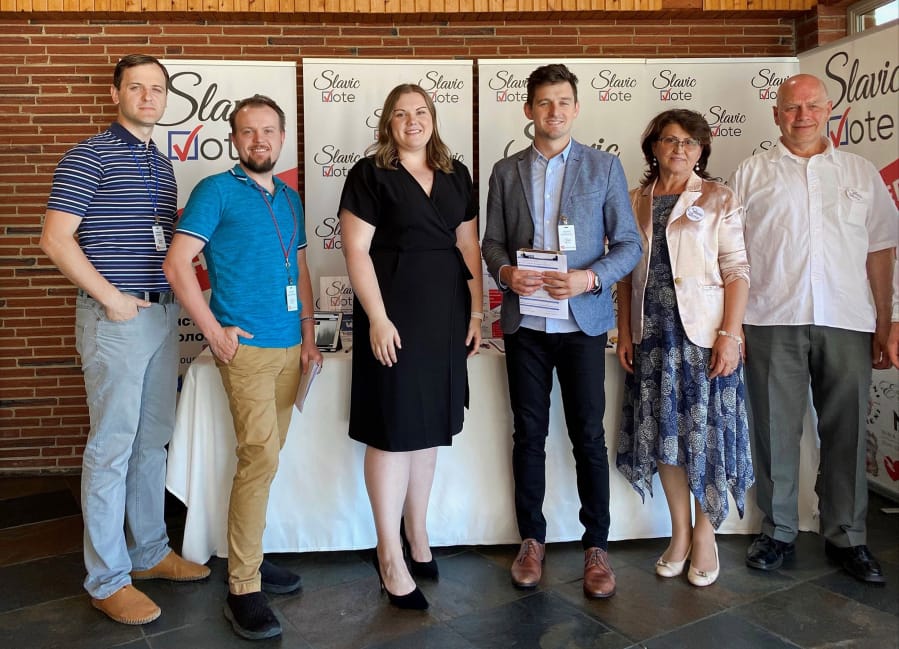Andrey Georgiyev, an immigrant from Ukraine, was frustrated that his large extended family would often complain about politics but not vote in elections.
“Out of that frustration was born Slavic Vote,” said Georgiyev, 30, of Portland.
It started as an idea to open an Instagram account to urge the Slavic community primarily in the Portland metro area to vote.
Slavic Vote’s other founders include Dmitriy Sashchenko, 31, who’s from Belarus and felt energized about elections and voting after spending time in Washington, D.C.; and Liliya Zhukova, 25, who studied politics at Washington State University Vancouver and worked on legislation in Olympia for a session, which she says isn’t common in the Slavic community. She emigrated from Ukraine 15 years ago.
For Slavics, there are two major barriers to participation in U.S. politics: language and mistrust of government.
“They just want to stay out of it,” said Sashchenko, a Portland resident. “People say ‘politics is evil.'”
Much of what Slavic Vote started off doing was breaking down that belief, explaining that while the U.S. system isn’t perfect, it’s not like the former Soviet Union.
Georgiyev said the mission of Slavic Vote is to empower the Northwest’s Slavic community in the democratic process by registering them to vote, educating them about how U.S. politics work and what different candidates represent.
Zhukova, a Vancouver resident, found people lack understanding of the political process and varying levels of government — the difference between a city councilor and state representative, whom to contact about issues and knowing that the president doesn’t make legislation in Vancouver. By surveying churches and community groups within Clark County, she estimated 60,000 Clark County residents who identify as Slavic are eligible to vote; many are not registered.
So far, Slavic Vote has registered about 2,000 new voters in the Portland metro area since it formed last spring. Zhukova said the COVID-19 pandemic resulted in lost opportunities to register people.
While Slavic Vote relies heavily on social media to encourage people to vote, those avenues tend to draw youth. For Slavic elders, who may have more trouble understanding English and navigating the internet, it’s more effective to register them in person. Slavic Vote held voter registration events on Sundays with the last being Oct. 25. (Oct. 26 was the deadline for registering online or by mail in Washington, although people can still register in person at the elections office up to and including Election Day, Nov. 3.)
Slavic Vote works with local elections offices, which it says have been good about translating materials.
“I think there’s still a lot of work to do,” Zhukova said.
She still does a lot of translating, particularly for elders who need to be shown how to fill out a ballot, where to sign and how to put the ballot in its privacy sleeve before submitting it.
“They really need that help,” she said.
Sashchenko, who’s working on the 2020 Census, said an estimated 150,000 people of Eastern European descent live in the Portland metro area. Some are U.S. citizens and some are not. He’s excited at the prospect that the 2020 Census may provide a more accurate count of how many Slavic people are here and how significant they could be as a group of voters.
Legacy of distrust
People move to the U.S. from Eastern Europe seeking opportunity, religious freedom and freedom to work however they want or start a business. Georgiyev said he still has some forks and spoons from Ukraine with the price stamped on them, which was set by the state. He said if you tried to sell them for a higher price in Ukraine, even if demand supported a higher price, authorities would put you in jail. He said his grandpa couldn’t maintain employment due to his religious views.
It’s these sorts of experiences in their former home that lead to a distrust of politics and politicians. But Slavic Vote says attitudes are shifting as more people get involved in local boards or run for office. For instance, Kyle Lyebyedyev, a Republican, is running for state representative in Washington’s 47th Legislative District and Anna Kasachev, also a Republican, is running for state representative in Oregon’s 22nd Legislative District.
Sashchenko said before the pandemic, Slavic Vote held a small campaign training and saw lots of interest, which he expects to see reflected during next year’s election cycle. When people hear leaders talk about the importance of voting, it creates a snowball effect, he said.
Zhukova said church leaders often aren’t sure how to involve themselves but are open to the idea of talking about voting and urging members to make selections that are appropriate to their families and values.
“Conversations are starting,” she said.
The Slavic community leans conservative. Slavic Vote surveyed participants asking them to rank different issues to see which were most important to the community. The resulting top 10 values were religious freedom, support for small businesses, lower taxes, parental rights, medical freedom, Second Amendment rights, private schools, less government and being pro-life and against LGBTQ rights.
For its voting recommendations, Slavic Vote reached out to candidates and scored them on whether they support or are against these values, a measure of how aligned they are with the Slavic community. For example, in Washington’s 17th Legislative District, Republicans Vicki Kraft got a 10/10, Lynda Wilson a 9/10 and Paul Harris a 2/10 while Democratic candidates Daniel Smith and Tanisha Harris both got a 0/10.
“The community is a lot more conservative,” Zhukova said. However, she added, youth don’t always align with their parents and may have more moderate views. “We do anticipate change.”
Slavic Vote plans to redo the survey in 2021 as the Slavic community in Oregon and Washington is changing and growing.
Sashchenko emphasized his motive for being part of Slavic Vote: “I want us to help the local government and help the communities around us understand the Slavic community,” its culture and values.




